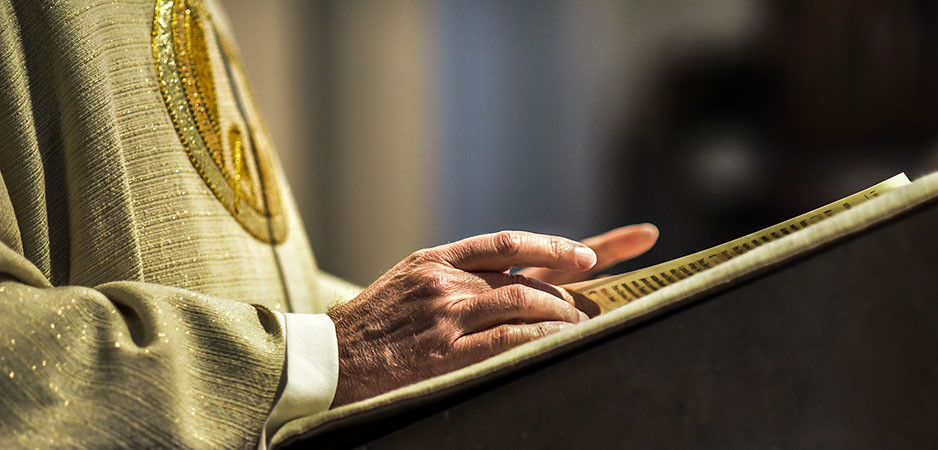My mother passed away a few years ago. She spent the last years of her life in a home for the elderly in a small town in Bavaria, where she and my father had spent most of their lives. In their younger days, both my parents were devout Catholics, initially taking at face value what the church taught. Later on, confronted with the daily hypocrisy and outright nastiness inherent in the institution, they gradually distanced themselves from the Catholic Church, disillusioned, disenchanted, if not worse. But that is a different story.
I myself spent eight years in a Catholic boarding school, initially with great enthusiasm, in later years increasingly disenchanted, seeking to get out. My parents would not hear of it, for good reasons which had nothing to do with the Catholic Church. I stuck it out until I was old enough to transfer to a different school.
Why Does God Allow Miscarriage?
A few months before my mother passed away, during one of my last visits with her, she suddenly, out of the blue, asked me a question that initially stunned me: “Why were you so eager to leave the boarding school?” Her eyes were insistent, her voice sounded almost desperate, looking for an answer that would alleviate her concerns and anxieties. At the time, I did not understand. Only a few weeks later, when I recalled the incident, it dawned on me: My mother was afraid that I had experienced sexual abuse, that my asking for being allowed to leave the place was a plea for help, and that, by refusing to take me out, my parents had been accomplices in abetting abuse.
I had the opportunity to alleviate my mother’s fears. I never experienced sexual abuse nor am I aware of any of my fellow students ever having been subjected to it. Yet this episode showed me to what degree the criminal behavior of legions of members of the Catholic clergy was causing mental anguish among ordinary believers like my mother.
Facing the Facts
Over the past few decades, the Catholic Church has been forced to face the facts in the wake of investigations that revealed the full extent of the depravity and corruption endemic to some of its institutions. In the process, once-eminent icons such as Pope Benedict’s brother, Georg Ratzinger, once the all-powerful director of the famous Regensburg Domspatzen (boys’ choir), have fallen hard. In some cases, even members of the Catholic Church’s gotha were convicted of crimes and sent to jail by worldly courts unimpressed by the status of the accused.
And yet, the McCarrick report recently released by the Vatican suggests that previous scandals have done little to bring about a fundamental change in the way parts of the Catholic hierarchy have been dealing with the question of sexual abuse that has fatally undermined the Catholic Church’s claim to represent a moral authority.
For those unfamiliar with the case, until his forced resignation in 2018, Theodore McCarrick was the cardinal of the Archdiocese of Washington, which encompasses the District of Columbia and surrounding areas in Maryland. This is of particular significance given that Maryland has an extensive history of Catholic settlement in the United States, dating back all the way to the 17th century. McCarrick was appointed cardinal of Washington by Pope Paul II, despite allegations that McCarrick had engaged in questionable behavior involving young aspiring priests — he slept in the same bed as seminarians.
Paul II did not believe the allegations. They reminded him of allegations at priests in his native Poland, promoted by the “communists” to discredit Poland’s Catholic Church. It was only under Paul’s successor, Pope Benedict XVI, that the allegations were taken seriously. But by then, it was too late.
By now it is established — and the report makes it quite clear — that Cardinal McCarrick has a long track record of sexually-inspired coercion, largely ignored and hushed up by the Catholic hierarchy, including the entourage of Paul II. As a result, as The New York Times recently put it, Paul’s image has been severely tarnished, his canonization (the elevation to the status of a saint) put in question. Pope Francis, under whose aegis the report was assembled, has made it entirely clear that he “Intends to rid the Catholic Church of sexual abuse.”
I, for my part, believe in his sincerity. The reality is, however, that he is confronted with a hierarchical structure which, in the past, has gone out of its way to dismiss, downplay and cover up reports of abuses, if only to uphold the authority of the church.
Absurd Theater
A recent prominent case is the absurd theater provoked by the Catholic Church of Cologne. Its cardinal, Rainer Maria Woelkli, had commissioned a law firm from Munich to investigate allegations of sexual abuse by priests in the archdiocese. The Cologne prosecutor’s office recently brought charges against one of them. He is accused of sexual abuse of his underage nieces in the 1990s.
Once the expertise was delivered to the Cologne archdiocese, it was kept under lock and key by the cardinal’s office, which charged that it was methodologically faulty and therefore useless. The real reason, critics suggest, is that the report implicates one of Woelkli’s closest aids, today archbishop of Hamburg, put in charge to make sure that the affair would be covered up.
The result has been a perfect example of mutual recriminations and mud-slinging. Those opposed to the way the diocese has handled the affair allege that Woelkli is more interested in protecting the perpetrators than the victims of abuse. In the meantime, church authorities have gone out of their way to censure and silence critics. A few days ago, they turned off the webpage of the archdiocese’s Catholic University Community, in charge of looking after the wellbeing of Catholic students at various universities in the region. The reason was, according to a Cologne newspaper, the community’s continued criticism of the “backward and evasive” attitude of Church officials with regard to controversial issues, including sexual morals.
In the meantime, the recent start of an official investigation by the Vatican has put additional pressure on Cardinal Woekli. The investigation concerns a priest active in three dioceses in the greater Cologne area. Tried and convicted of sexual abuse of children and dependents, the priest had been sent to jail in the early 1970s. After his release a short time later, church officials reinstalled him. In the late 1980s, he was once again convicted of sexual abuse. And, once again, he was allowed to continue his active service. It was not until 2019 that he was retired, most likely as a result of the expertise commissioned by the archdiocese.
In sharp contrast to the Cologne church authorities, the Diocese of Aachen, whose cathedral was the site of the coronation of German kings between 936 AD and 1531, recently announced it would no longer privilege the perpetrators of abuse — an independent report established numerous cases of abuse by priests in the diocese — over the rights of their victims. Unlike hushing up abuse, church authorities in Aachen launched a newspaper campaign asking victims of clerical abuse to contact church offices.
Not Draining the Swamp
What all of this suggests is that a significant segment of the Catholic hierarchy has absolutely no interest in “draining the swamp,” to borrow a term from an entirely different source. The reality is that the avalanche of revelations about sexual abuse rampant inside the Catholic Church has not only severely undermined its authority to speak on matters of morals, particularly when it comes to sexual mores, but its authority in general. In late 2019, a mere 14% of the German population said they trusted the Catholic Church; 29% said they trusted the pope. In contrast, 36% expressed trust in Germany’s Protestant Church.
You don’t have to be a prophet to suggest that the most recent revelations about sexual abuse and the way these have dealt with will further tarnish the church’s already dismal image and its moral authority. And for good reasons. The Catholic Church’s position on homosexuality is a joke given the prevalence of homoerotic endeavors within the church itself. As Shakespeare put it so eloquently, the priest “doth protest too much, methinks.”
The Catholic Church’s position on birth control is also risible, given the fact we no longer live in an age where the survival of the tribe depended on replenishing its membership. Those who don’t know what this means might want to read the story of Onan, famous (wrongly so) for being the father of masturbation. Onan’s crime — in the eyes of the Lord — was not that he masturbated, but that he preferred to “spill his seed” outside of the vagina of his late brother’s betrothed rather than fathering an offspring that would be credited to his dead brother.
Today, we are no longer subject to archaic tribal rationale. Yet the Catholic Church still pretends that we are. Unfortunately enough, President Donald Trump has managed to stuff the US Supreme Court with prominent legal minds stuck in a pre-Middle Age way of thinking. Most of them are Catholics, Amy Coney Barrett the most recent one. In a world where the moral authority of the Catholic Church has been debased to a degree that even in Poland, the home of Pope John Paul II, a mere 10% of young people see the Catholic Church in a positive light, with 47% viewing it negatively, the Catholic Church and its representatives would do well to keep a low profile.
In reality, the opposite is the case. High-ranking Catholic officials continue to take the moral high ground while pretending that sexual abuse is negligible. As Arthur Serratelli, a retired bishop from New Jersey, put it last year, “Is the terrible crime of child abuse limited only to Catholics? Today’s media would even have people believe that abuse of minors is becoming more frequent within the Church. Patently false. But, too often facts do not matter when a villain is needed.”
Serratelli should know. During his time as an active bishop, the New Jersey dioceses were a hotbed of sexual abuse by priests. In 2019, New Jersey’s bishops listed some 200 priests “found credibly accused of sexually abusing a child.” To be sure, sexual abuse of minors is hardly limited to the Catholic Church. Quite the contrary. But given its claim to be the ultimate yardstick of moral authority, it should be held to the highest standards. The notion that the Catholic Church is not any worse than any other institution, as Serratelli implies in his defense of his own institution, does not cut it.
Luckily for the Serratellis and Woelklis of this world, Jesus is no longer around. As he once said, “If anyone causes one of these little ones–those who believe in me–to stumble, it would be better for them to have a large millstone hung around their neck and to be drowned in the depths of the sea” (Matthew 18:6). Those concerned are advised to study Houdini. His tricks might come in handy.
The views expressed in this article are the author’s own and do not necessarily reflect Fair Observer’s editorial policy.
Support Fair Observer
We rely on your support for our independence, diversity and quality.
For more than 10 years, Fair Observer has been free, fair and independent. No billionaire owns us, no advertisers control us. We are a reader-supported nonprofit. Unlike many other publications, we keep our content free for readers regardless of where they live or whether they can afford to pay. We have no paywalls and no ads.
In the post-truth era of fake news, echo chambers and filter bubbles, we publish a plurality of perspectives from around the world. Anyone can publish with us, but everyone goes through a rigorous editorial process. So, you get fact-checked, well-reasoned content instead of noise.
We publish 2,500+ voices from 90+ countries. We also conduct education and training programs
on subjects ranging from digital media and journalism to writing and critical thinking. This
doesn’t come cheap. Servers, editors, trainers and web developers cost
money.
Please consider supporting us on a regular basis as a recurring donor or a
sustaining member.
Will you support FO’s journalism?
We rely on your support for our independence, diversity and quality.






